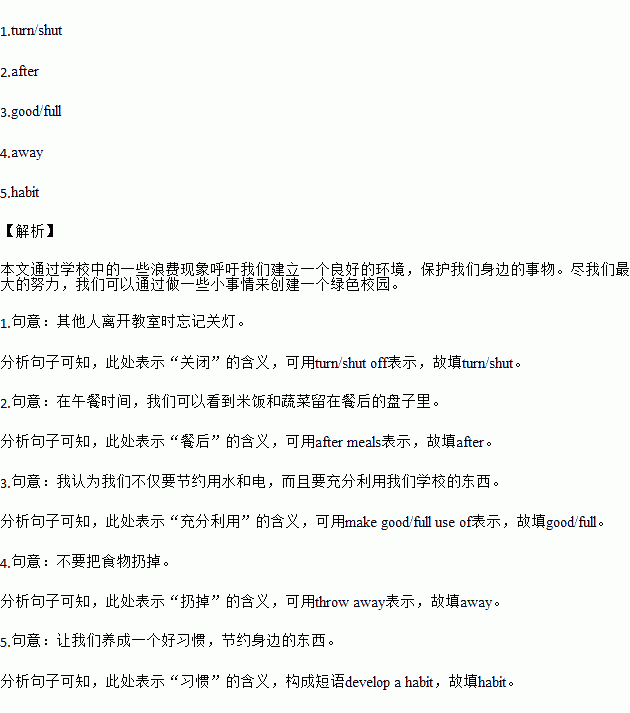题目内容
针对校园浪费严重的现象,校团委在学校学生微信群里发出了“校园节约,从我做起”的倡议,请将微信的内容补充完整,每空一词。
@everyone: |
We are sorry to see so much waste in our school! Some students often leave the taps on when they don’t need to use water, others forget to 1. off the lights when leaving the classrooms. There is a lot of paper that is wasted here and there. At lunch time, we can see rice and vegetables left on the meal plates 2. meals. I think we should not only save water and electricity but also make3. use of our school things. Don’t throw food4.. Let’s develop a good5.and save things around us. Try our best and we can create a green campus by doing pieces of small matters. |
 口算能手系列答案
口算能手系列答案The World’s Famous Buildings
Name |
Sydney Opera |
Statue of Liberty |
Big Ben |
Leaning Tower of Pisa |
Place | Sydney (the biggest city) | New York (the biggest city) | London (the capital) | Pisa |
Country | Australia | America | Britain | Italy |
Continent(洲) | Oceania(大洋洲) | North America | Europe | Europe |
Building time | 1957~1973 | 1874~1884 | 1856~1859 | 1173~1372 |
Shape | Sail(帆) | Goddess | Clock | Tower |
Designer(设计师) | Jorn Utzon (Danish)(丹麦的) | Auguste Bartholdi (French) | Edmund Fielding Green (British) | Unknown |
根据表格所提供的信息选择最佳答案。
1.If you have a chance to go to the UK, you can’t miss _______.
A.Big Ben B.Statue of Liberty C.Leaning Tower of Pisa
2.From the information above, we know that Leaning Tower of Pisa has a history about ____ years.
A.two hundred B.six hundred and forty C.seven hundred and forty
3.Sydney Opera House looks like ______.
A.a tower B.a clock C.a sail
4._____ famous building(s) is/are in Europe.
A.One B.Two C.Three
5.Which of the following is NOT true according to the information above?
A.New York is bigger than any other city in America.
B.Only Sydney Opera House was designed by an Australian designer.
C.Statue of Liberty is a shape of a goddess.





